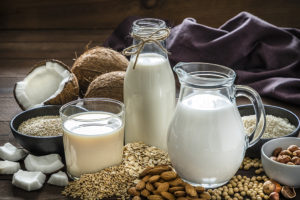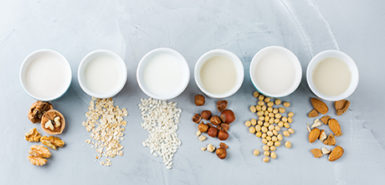
Navigating the milk aisle has never been more challenging. The options are endless, and the health advice is sometimes controversial.
So how do you choose the best option? The most important thing you can do is develop a rich understanding of the types of milks and milk ingredients and how they affect your body.
Facts to digest
Many folks may notice some unpleasantries when consuming cow’s milk or products made with cow’s milk. This can include bloating, gas or diarrhea. These symptoms are often a result of the body’s inability to digest the natural lactose sugar in milk.
We need specific enzymes to digest the nutrients we eat. For lactose, we need the lactase enzyme.
The body tends to produce less of this enzyme as we age, however, because humans weren’t meant to continue drinking milk after weaning as youngsters.
This is known as lactose intolerance.
One option to alleviate this: Consume lactose-free cow’s milk—it’s treated with the lactase enzyme—or switch to a plant-based alternative that’s naturally lactose-free.
Items such as yogurt and cheeses are also low in lactose, as the activity of the added bacteria and fermentation eat up much of the lactose sugar in the milk.
Keep in mind that even lactose-free dairy options can still bother sensitive stomachs. In this case, plant-based milks are your best bet.
Calcium and bone health
The first thing that comes to mind for most of us when we think about drinking cow’s milk is bone health.
Cow’s milk is a great source of calcium and, since our bones are made of about 65% calcium, one would assume cow’s milk is essential for bone health.
So, is it? The answer is yes and no.
We certainly need calcium for bone health. But some research studies have found no association between milk intake and bone health.
In fact, one observational study found that people who drink more milk may experience more bone fractures than those who drink less. Some studies have shown a possible higher risk for bone fracture in men.
If you’re concerned about bone health, you can certainly do without milk—or less milk—and still have healthy bones.
Many plants are great sources of calcium. They can supply what you body needs to support bone health, as well as providing other essential bone-building nutrients, such as vitamin K.
You can get what you need from soybeans, white beans, mustard greens, turnip greens, collard greens, dandelion greens and molasses.
Many plant-based alternative milks are also fortified with calcium for an additional boost.
What’s best for you?
There have been some possible associations between milk consumption and cancer risk, especially prostate cancer.
Researchers have found that men who consume higher amounts of cow’s milk have a greater risk of prostate cancer. This is thought to be related to the natural hormones found in milk.
However, there also seems to be some protective effect from milk as it relates to colon cancer.
To help you determine if milk is appropriate for your diet, talk to your primary care provider.
Nutritional profile
Cow’s milk has advantages in the protein and potassium category. The downside of many plant-based milks is the low protein profile.
Nutritionally, the substitution is not always 1:1. Soy milk tends to be the most comparable. It’s recommended as the best substitute if you’re using milk for a protein boost.
Most Americans are not deficient in protein, however, and they can easily meet their protein needs with other high-protein foods.
For those trying to trim calories for weight loss, some plant-based alternatives can offer benefits in this area while still providing that milky flavor.
Whole fat vs. low fat
If we look just at cow’s milk, there are a variety of options—fat-free, 2%, whole milk and more. Whole milk, or vitamin D milk, is left in its original form, with about 3.25% fat content.
Milk labeled as 1% or 2% has had the fat removed to its respective percentage, while skim milk has all fat removed.
Whole milk provides a more flavorful option that may help people feel fuller and more satisfied. You’ll also find lower rates of diabetes and fewer weight issues in children drinking whole milk, as the milk fat may protect from blood sugar spikes.
In adults, there’s no association of weight gain with full-fat milk. There are mixed results as it relates to coronary heart disease or stroke, with some benefit in swapping milk fat with fish or nuts.
Keeping things as close as possible to what nature gave us is usually a safe bet.
While it does provide more calories if you choose to drink cow’s milk, whole milk may be a good option, especially for youngsters.
This may be left to your own personal preference—and as always, moderation is key.
Additives
In the creation of plant-based milks, the milk base—almonds, oats, soy—is typically soaked in water and then blended. The solids are then strained out, so what you have left is your plant milk.
This is great, but to keep it from spoiling—and to ensure the best flavor and texture—many plant-based milks have several additives we’d be better off without.
Here’s what to look for:
- Added sugars: Unless a product is labeled unsweetened, watch out for added sugars in most milks.
- Gums: These are used to thicken products for creamier texture. They are soluble fibers extracted from plants. Some can benefit gut health. Other emulsifiers, such as carrageenan, may be detrimental to gut health.
- Ascorbic acid: This is vitamin C, used to preserve food.
- Oils: Oils are added for a better mouthfeel, but these are usually highly processed oils. It’s best to limit intake.
- Phosphates: People with kidney disease need to watch phosphate intake to avoid high phosphate levels in their blood. For others, high intake of phosphates may be associated with higher risk of heart disease.
- Natural flavors: The term natural is used very loosely. This is an umbrella term that covers a lot of options. Manufacturers often use synthetic chemicals to create the flavoring, which ends up in your food. People with food allergies should keep an eye on these ingredients.
- Vitamins and minerals: There are typically no problems here.
Your best bet? Make your own milk, or look for brands with minimal additives.
Flavor and versatility
What about the taste of your milk? This comes down to personal preference.
Try different kinds of milks until you find your favorite.
In cooking, plant-based milks can substitute in most recipes without noticing a difference. Just buy plain milk instead of vanilla-flavored for savory dishes.
My personal choice: Given the mixed evidence with cow’s milk, I choose to use unsweetened almond milk. This is based on my flavor preference, but it also has less sugar and fewer additives. It’s also a lower-cost option.
I also enjoy some fermented dairy, such as aged cheeses and yogurt—and always in moderation.
 /a>
/a>
 /a>
/a>
 /a>
/a>
If you’ve never had fresh milk, direct from the farm, you’ve missed a great product experience. As a former dairy farmer, cow milk that is, including milk in your diet, if your body tolerates it well – it’s great nutrition, vs what is often substituted – sugary drinks!!
My family enjoys skim milk. It’s low fat and an inexpensive source of protein.